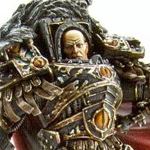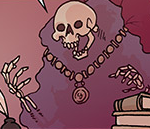|
As for me specifically, I don't know why anyone cares about Star Trek when Science Fiction has already been definitively solved by Warhammer 40,000
|
|
|
|

|
| # ? May 25, 2024 00:33 |
|
Bedlamdan posted:As for me specifically, I don't know why anyone cares about Star Trek when Science Fiction has already been definitively solved by Warhammer 40,000 My choler rises at such a thing.
|
|
|
|
RocknRollaAyatollah posted:My choler rises at such a thing. With the way things are going, that's the vision of the future we're most likely to have. Now be quiet and let the Magos convert your skull into a toaster.
|
|
|
|
gradenko_2000 posted:Extremely hot take: Orville is the better Star Trek series, but Discovery is more gameable because the set-up is literally that they have a license to be murderhobos in service of winning the war against the Klingons. I agree with this on the whole. Discovery fits right in with what many players would do in a Star Trek game - disobey orders, violate chain of command, solve problems by indiscriminate killing, and generally do whatever the gently caress they want because they know they're the good guys, which makes whatever they do justified. I haven't run across a gaming group who will take orders from an NPC without trying to subvert or undermine those orders. The Orville's Captain Mercer also ends up subverting and undermining his superiors with regularity. So I think that both series would work pretty well for gaming in terms of allowing players freedom to take action outside the bounds of following orders as long as your players were on board with the notion that solving problems with killing should be exceedingly rare. I suppose it depends mainly on two things: whether you want episodic play or a big overarching plot, and whether your fellow players can handle being told "No, you can't just kill all those dudes - that's not star trek. Find another solution."
|
|
|
Arivia posted:Okay letís talk about how Elminster is the coolest motherfucker Elminster is the opposite of cool.
|
|
|
|
|
hyphz posted:So have people who have played AW (actual AW, not the spinoffs) found it to naturally incline to misery and when it is run in that way does it appear easier to run or more coherent than when not, or than other PbtA games? Whoof. Man, there's still some fundamental misreading here. Lemme see if I can clear things up for you a little? Like, first off, AW and Blades in the Dark are, neither of them, about some average level-0 joe clawing above the rank and file. In AW, you are *tagonist level - you run Bartertown, you lead some War Boys, you're the spooky one everybody's careful around, you have all these loving guns. In Blades, you're part of a crew that has the potential to be a shadow power in the city, but even before then, you have a stress track, which is the only thing that lets you look at any of the bad poo poo incoming from the world and say "not here, not now, not to me". So when you take action and succeed, you can learn or do or overcome a hell of a lot. And in either game you are generally capable, which means there's not an insurmountable gap between the worst any PC can be at something and the best that you can be. So let's start there, with people who are already big goddamn deals compared to most of the other people around them. Apocalypse World tends to focus a lot less on a united front taking on a single big problem and instead plays around a diverse group of people, each with their own interests, sometimes working at cross-purposes, and what they have to worry about is the entire world. Like, potentially, anyway. What they end up dealing with is probably better thought of as threats from a wide variety of sources, but handling any one of those threats is, in the short term, fairly shallow. Like, you're a Savvyhead, and you've got some pricy new kit in your workshop and you have to come to grips with it, and loving Sling is probably going to try and run his protection racket on you again, and at any point somebody who was kind or canny enough to pay in advance is going to drop by with a ton of repair work on short notice, and somebody in an extremely clean suit just showed up asking after somebody you're caring for in secret and the artifact you lifted off their unconscious body, and the pricy new kit came along with this huge medicine caravan, who are all setting up temporary shop in the immediate vicinity and who knows what kind of strangers, illnesses, or strange illnesses came along for the ride. It's not like any one of those things is suddenly going to turn and obliterate you utterly, but you've got to keep up with all of them, and one you're not currently focusing on might suddenly demand your attention. Dealing with it is going to be a matter of making like two-three rolls before things get resolved, at most? Usually? And the GM is given tools for managing this wide array of threats and interests and having them to reference and turn against the players. As far as attrition goes, PCs don't have a lot to casually lose. I mean, there's barter, which, well, money in money out. There's other sorts of supplies too, but they would have had to buy most of them in the first place. There's their 6 hit points, but risking even one of those might come with knock-on effects, and the last three are more of a clinging-to-life thing, so, well, either you're willing to get hurt or you're not. There's the potential to risk their more notable things, the things that define them, but staking any one of those is much more dramatic and deliberate. But if it's something huge that concerns everyone, the GM has tools for that too. It's called a countdown, but it really isn't any different from the average PC's way of tracking their 6 hit points. Obviously anything that gets, you know, physically engaged is going to have a very obvious countdown to deal with, but as a player-visible tracker for a bunch of other things it also suffices. Like, if the hardholder decides to set up their hardhold so they have maximum possible benefits and wants, but misses the management roll and has them all come due, suddenly everybody concerned has to deal with all that chaos. And you have a countdown representing the "health" of the hardhold, as opposed to chaos and misrule, that's currently at space 3 out of 6, and the individual things PCs will attempt to accomplish in two or three rolls are all trying to heal it. ...probably. Blades in the Dark is a lot more explicit about clocking. Like, if they don't bypass the search through the Dimmer Sisters' spooky house, the GM draws out a clock four or six or eight segments big, probably eight since the Sisters are higher than the PC crew at the moment of the example and the search is intended to be somewhat involved, and as the PCs describe what they're doing to search the place the GM sets a base effect level of 1, 2, or 3, with 2 as the baseline, and tells them about the position of the roll, which will usually start off at the position they left the engagement roll in. So you go around the table, everyone for sure rolls at least one 6, and then you're through the house and clean, bing bing bong, so simp- (1 1 2 3 1) oh dear. Blades has a lot more to casually use and lose. There's stress to bump rolls, start flashbacks, and resist everything, loadout slots to commit to the problem at hand, harm to take, and afterwards, coin and reputation to get all of that back or pay it forward for the next time. But the thing about each of these games, that I think will help the giant list of GM moves that looks like a menu of catastrophe make a little more sense to you, is that very rarely is anybody looking at you to find out what they've won. The upside is right in front of them. Your Blades crew knew what clocks they were trying to tick and for how much when they made the roll in the first place. Your Apocalypse World PCs have all the benefits of their moves listed in front of them, too, but the downsides are more variable. So, the giant list of moves is half ways to set the stage - offer opportunities, detail consequences, announce future badness, make small initial moves like separate them or put them in a spot - and the other half is enough of a variety of potential downsides, that when it comes time to present one there's enough variety that you can find one to fit most situations, and you don't feel like the only thing there is to do is inflict harm as established. AW, specifically, as I've run and played it, is a game that has a lot of space for bad things to happen in, like actual, meaningful bad things, not just "you lose 10 out of your 100 hit points, ouch". But that's different from being a game where a lot of bad things are happening. It's more like... a game where a lot of bad things aren't happening, and you're dealing with the ones that are?
|
|
|
|
Pull up, Maverick! Pull up!
|
|
|
|
Bedlamdan posted:All I did was copy paste other peopleís defenses of Discovery, so take it up with them! Source your quotes
|
|
|
|
Down With People posted:hyphz have you actually read AW? I'm curious about that as well.
|
|
|
|
Has there ever been a tabletop RPG made for Dune? I feel like an ASoIaF/L5R-type game that's heavily social and political would work well in that setting.
|
|
|
|
|
Drone posted:Has there ever been a tabletop RPG made for Dune? I feel like an ASoIaF/L5R-type game that's heavily social and political would work well in that setting. Yes - sadly it's not very good. FATAL and Friends entry
|
|
|
Flavivirus posted:Yes - sadly it's not very good. FATAL and Friends entry Welp. Any suggestions for a good reskin of something else to adapt to Dune? Edit: oh. Apparently there's a (very well?) fleshed out supplement for running Dune within Burning Wheel. That looks really cool. Drone fucked around with this message at 15:11 on Feb 22, 2018 |
|
|
|
|
Austria felix nube posted:I'm curious about that as well. Yes, I have. The problem with the GMing principles thing is that it does a great job of telling me how not to screw the players, but I don't want to do that anyway. It doesn't do the much harder job of being something that I can point to, to prove that I didn't screw the players after the failure has already happened. I mean, it seems to be that after a failure (assuming the failure wasn't fun, I know they can be, but sooner or later that well will dry up) the players can think one of several things: a) We made the wrong choice. b) It's a hard world. c) The dice screwed us. d) The game system screwed us. e) The GM screwed us. These are roughly in decreasing order of desirability from my POV (except if you're playing D&D 5e you can swap d) into second place because most players will accept it when 5e screws them). A miserable post-Apoc type setting increases the possibility of b), but c) and below can decay into each other quite easily. It's just about avoiding that happening, and a) seems especially hard to get in a fail forward system where the PCs can't just try a different choice.
|
|
|
|
hyphz posted:The problem with the GMing principles thing is that it does a great job of telling me how not to screw the players, but I don't want to do that anyway. It doesn't do the much harder job of being something that I can point to, to prove that I didn't screw the players after the failure has already happened. Can I ask for an example of what you mean by this? Do you mean something like: "look, the book says the lock DC was 17, and that ogres are supposed to spawn if you fail the roll. I wasn't screwing you over. You've also explored everything, according to the map, so there wasn't another path you could have gone down."
|
|
|
|
hyphz posted:Yes, I have. I'm just not sure I could play with a group that was that obsessed over setbacks. The risk and challenge is part of the point, surely?
|
|
|
|
hyphz posted:The problem with the GMing principles thing is that it does a great job of telling me how not to screw the players, but I don't want to do that anyway. It doesn't do the much harder job of being something that I can point to, to prove that I didn't screw the players after the failure has already happened. Look at it like this:
Using your metric, the wrongest choice the players can make (a) is the choice to not engage with the system, because that guarantees a bad result. But if you do engage with the system the dice (c) can still hand you a bad result. You could argue that the GM is the ultimate source of all bad outcomes and arbiter of their relative magnitude, but that's true of all (GMed) roleplaying games. The real distinction is that AW -- and BitD -- are actually well-designed games, so the D&D option of avoiding trouble by refusing to engage with the system is absent. The GM actually has less power to arbitrarily gently caress you over in AW and its derivations because they don't get to make unilateral insertions into the narrative.
|
|
|
|
hyphz posted:Yes, I have.
|
|
|
|
Nifara posted:
It's not just about risk and challenge on its own. As has been said, they can be fun, especially if the players are down for it (this was part of why the "miserable world" explanation resonated). It's about the fact that sooner or later there's going to be a failure that causes a major problem. The most obvious is the sudden death of a PC, but I know most systems including AW insulate against that. But they don't insulate against failures, or especially chains of failures, causing problems like: a) a series of failures making a character who was supposed to be good at something look like a prat; b) a series of failures damaging spotlight balance, normally by undue shift of the spotlight to the failing character; c) a failure or series of failure damaging story pacing or shifting it to a topic that the players, or the players other than the failing character's, aren't going to find interesting; d) a failure or series of failures requiring a response that contradicts or makes farcical established handwaved factors of the setting (a good example of this was in a classic sci-fi style game where there's no problem having an icy planet of ice and people live on it for some reason but people live in caves but you can't just land next to one because some reason, Star Trek etc do that all the time, but it got silly when the PC tech guy couldn't haul their rear end up a cliff and they had to go to another planet to buy a rope) e) a series of fail-forwards or fail-sideways accidentally introducing "quantum bears" (I use this only as an identifying term, I don't see quantum bears per se as a problem, only the possible later effects they have) that come to ruin later events.
|
|
|
|
potatocubed posted:The GM actually has less power to arbitrarily gently caress you over in AW and its derivations because they don't get to make unilateral insertions into the narrative. I'm going to be a little anal-retentive here when I say that most games, even (or perhaps especially) D&D do have specific rules limiting how arbitrary the DM can be, by defining how hard the monsters can be, how much damage a trap can inflict, and how high DCs can be set, often relative to the party's level. The "magic" of PBTA, so to speak, is that it's a lot more explicit about these limits, rather than leaving the GM to divine it themselves out of the tables and charts of how high DCs and monsters CRs can go.
|
|
|
|
There's really nothing in the rules of D&D telling a DM he can't make PCs fight monsters 20 levels higher than them or set the DC of a check at 55. That behavior would be considered lovely DMing, but it wouldn't be considered "breaking the rules", and there's something to be said for being a bit more explicit than that.
|
|
|
|
|
Lurdiak posted:There's really nothing in the rules of D&D telling a DM he can't make PCs fight monsters 20 levels higher than them or set the DC of a check at 55. That behavior would be considered lovely DMing, but it wouldn't be considered "breaking the rules", and there's something to be said for being a bit more explicit than that. Thing is, people use this as an example but it's obvious that the GM is actually screwing the players over in that case. What's more problematic is when the GM has to choose if there are 3, 4, 5 or 6 orcs in the room they've just burst into, doesn't want to screw the players but does want to challenge them, and one or two extra orcs beyond what the party can handle could turn the encounter to a TPK. Even in this case, the GM can bail out (the extra orcs can run away after the others are defeated) but if it's not orcs but the entire layout of the dungeon then that's much harder to justify. Or they can nullify the system (fudge the orc's HP in the middle of the fight) but that seems harder in AW type games, technically because the moves have greater and move visible effects that are harder to hedge without making it obvious that it's happening, and theoretically because the point of narrative games should be that they don't need nullification in that kind of situation.
|
|
|
|
Drone posted:Welp. Burning Sands is one of the first supplements ever for Burning Wheel, so I had a hard time grasping it, but it does look really cool. e: Another option I have considered is to hack something from the board game?
|
|
|
DalaranJ posted:Burning Sands is one of the first supplements ever for Burning Wheel, so I had a hard time grasping it, but it does look really cool. Burning Jihad is the one I was thinking of.
|
|
|
|
|
Lurdiak posted:There's really nothing in the rules of D&D telling a DM he can't make PCs fight monsters 20 levels higher than them or set the DC of a check at 55. That behavior would be considered lovely DMing, but it wouldn't be considered "breaking the rules", and there's something to be said for being a bit more explicit than that. Sure there is. In TSR-era D&D, there's a prescribed list of monsters depending on the dungeon level. The 3e, there's an upper limit of CR that you can use against the players. In 4e, there's a specific encounter budget that you need to abide by. When it comes to skills, TSR doesn't even let you "set a DC" because everything is either a d20 or a percentile roll under. You can apply a +/- 10 to 20% modifier, but that still puts a limit on how hard you can make a check. In 3e, you have wooden doors (break DC 13, open lock DC 15) and scaling up to iron doors (break DC 28, open lock DC 28). In 4e, there's a specific table (the infamous page 42) of DCs that you should use for skill checks, relative to player level. GMs can ignore these rules, and perhaps often do out of ignorance rather than deliberately, but you're not really supposed to if you knew that they existed. gradenko_2000 fucked around with this message at 16:24 on Feb 22, 2018 |
|
|
|
Drone posted:Burning Jihad is the one I was thinking of. Yeah, I think thatís the one I meant.
|
|
|
|
Plutonis posted:Deep Space 9 I echo that this is the truest statement in the thread. Drone posted:Has there ever been a tabletop RPG made for Dune? I feel like an ASoIaF/L5R-type game that's heavily social and political would work well in that setting. poo poo, I was just about to ask this question! Let's take it in a different direction then - would a hack of Houses of the Blooded be a good basis for a Dune game? Caveat: I know very little about Houses of the Blooded other than it's supposed to be a game about nobility?
|
|
|
|
hyphz posted:Yes, I have. Sure it does. You announced future badness, didn't you? You put someone in a spot, didn't you? You told them the consequences and asked, didn't you? You inflicted harm as established, didn't you? If you did all or most of that, the audit trail isn't lying dead in the book, it's out there alive in the conversation.
|
|
|
|
Drone posted:Welp. I have a FUDGE Dune hack that you're welcome to have if you want it. (I decided FATE was a little wonky for the first-timers I was running the game for.)
|
|
|
|
Can someone tell me why FATE moved from having weighted aspects as attributes to an explicit attribute/skill system supported by aspects as a part of the FATE point engine? I assume there might be some blog posts about it?
|
|
|
|
Glazius posted:Sure it does. You announced future badness, didn't you? You put someone in a spot, didn't you? You told them the consequences and asked, didn't you? You inflicted harm as established, didn't you? Yeah, to continue this on, for me this is probably the thing that AW does best. When you get AW right, basically the consequences of actions should seem right to everyone at the table. If I push a loving gun in your face and tell you to give me the money or I blow you head off, go aggro, and follow through... well, then I blow your loving head off. Maybe, if you're a tough bastard or a lucky piece of poo poo you'll drag yourself away bleeding and dying, but generally, you're done. If you do it to do it the consequences should be pretty obvious. AW isn't about sudden surprises. It's not about the GM going "Aha! Gotcha!". Someone dies in a raid? Well you announced that, right? You told them the consequences, right? You inflicted harm as established, right? If your players feel like it's not fair, and they're not just dumb immature idiots, then it's because you've dropped the ball. Because you've not gone "this is gonna be bad". You've not made it clear that the blade he's holding is laced with poison. You've not announced that future badness. There's no shame in going back, or twisting the fiction. If I think I've announced future badness and I slam a poison blade into your skinner, and I'm like "you're dying now", and everyone round the table says "wait what, where did that come from? The blade was poisoned?", then I need to realise I've screwed up and not make this final. I need to take that as the announcement of future badness. "Man," I say, "if you don't get treatment in the next few hours that poison's gonna wreck your nervous system". Now the story is them finding some kind of Angel, or a hidden cache of medical supplies, to avoid that future badness you announced. And if you can't think of anything, throw it to the table - that's also in the rules. Say "you've been stabbed with a lethal poison - so why hasn't your character just died already? What makes them so tough?"
|
|
|
|
It requires a hideous cosmic alignment for me to agree with Arivia about anything but Elminster is great. I love the fact that the major Quest-Giving NPC in Forgotten Realms is a crotchety old jerk with a terrible sense of humor. I especially love the fact that one of the major Realms villains has as part of his backstory "I turned evil because I was supposed to work with Elminster and he is just such a loving curmudgeon that it drove me to the dark side." I guess if you play according to Order of the Stick rules-as-written he should have solved all problems forever, but whatever, sometimes you gotta handwave.
|
|
|
|
Rand Brittain posted:It requires a hideous cosmic alignment for me to agree with Arivia about anything but Elminster is great. I love the fact that the major Quest-Giving NPC in Forgotten Realms is a crotchety old jerk with a terrible sense of humor. I especially love the fact that one of the major Realms villains has as part of his backstory "I turned evil because I was supposed to work with Elminster and he is just such a loving curmudgeon that it drove me to the dark side." I mean sure, I can see liking whatever part of his characterisation (he appears in the BG games and is fine), but as a whole he is the most "boring guy tells you about his totally badass d&d character" motherfucker ever
|
|
|
|
A large section of the 3e Epic Level Handbook is just the writer telling you about Elminster & His Awesome Friends.
|
|
|
|
Does anyone still read order of the stick
|
|
|
|
Rand Brittain posted:It requires a hideous cosmic alignment for me to agree with Arivia about anything but Elminster is great. I love the fact that the major Quest-Giving NPC in Forgotten Realms is a crotchety old jerk with a terrible sense of humor. I especially love the fact that one of the major Realms villains has as part of his backstory "I turned evil because I was supposed to work with Elminster and he is just such a loving curmudgeon that it drove me to the dark side." He's also a creepy old dude who polymorphs himself and has sex with monsters.
|
|
|
|
Plutonis posted:Does anyone still read order of the stick It's more a reference to the forums culture at this point. The strip mostly referred to hard game mechanics so as to laugh at them, but from the resulting well of actually, a strange beast was born and, some say, demands precise copper-piece accountings of mustard prices to this day.
|
|
|
|
RocknRollaAyatollah posted:He's also a creepy old dude who polymorphs himself and has sex with monsters. Elminster can gently caress all the otyughs he likes, I just don't want to hear about it from dudes with one hand under the table.
|
|
|
|
I can see how establishing threats makes the narrative fairer, but not how it helps with the game aspect. It might eliminate problems with preparation, I suppose. If the players can choose not to face the threat while still achieving a goal, that works, but that canít always be the case. If the players know in advance that the guyís using a poisoned blade that doesnít stop them thinking Iím an rear end in a top hat for giving him it, and heck, I canít see the narrative value of doing so at the point of combat either (a poisoned blade and a regular knife both kill you).
|
|
|
|
Glazius posted:It's more a reference to the forums culture at this point. The strip mostly referred to hard game mechanics so as to laugh at them, but from the resulting well of actually, a strange beast was born and, some say, demands precise copper-piece accountings of mustard prices to this day. It's just it's like I looked at a strip recently and it's 40 panels of dialogue and people talking in a single page. Why not just write a book at this point.
|
|
|
|

|
| # ? May 25, 2024 00:33 |
|
Drone posted:Has there ever been a tabletop RPG made for Dune? I feel like an ASoIaF/L5R-type game that's heavily social and political would work well in that setting. Fading Suns is basically Dune, and the setting is pretty good. I've never played it, but the system looks mediocre. Plutonis posted:It's just it's like I looked at a strip recently and it's 40 panels of dialogue and people talking in a single page. Why not just write a book at this point. For the same reason he doesn't do it as a comic with actual art, lettering or coloring, because then it would be judged on those standards
|
|
|































